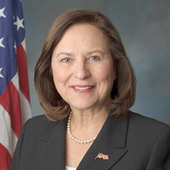A simple truth
It's a simple truth that a government should not intentionally make life harder for its people. The bad habit of governing by crisis management and the failure to get our fiscal house in order have made life difficult for Americans.
In Nebraska and in so many other states across this nation, we actually work together -- and not just on small bills, but also on the big issues. While I served in the Nebraska Legislature, we dealt with a major budget shortfall. We didn't go on TV and Twitter and fight -- we legislated. We fixed the problem.
That's the Nebraska way -- we roll up our sleeves, cut through the talking points, and get to work. Nebraskans are pragmatic and they are well informed. So when Nebraskans look at the dysfunction in Washington, they're frustrated -- and I am too.
A furloughed federal worker from Omaha called my office to say, "We're all tired," he said. "We're tired of not getting a budget to the last minute. We're all tired. You guys need to do your job."
I agree. That's why I am talking with my colleagues -- not publicly in front of cameras -- but privately to see if we can forge a way forward. But I believe we have to do more than just open the up the government -- that's just the basics. We also have to address our $17 trillion debt -- it's smothering our country, it's jeopardizing our national security, and it's a threat to our children's future.
Congress will soon vote on increasing the debt ceiling -- the sixth debt limit increase in the past five years. Our national debt has almost doubled since 2006 and our debt limit has grown twice as much as our economy in the past two years.
Shouldn't the opposite be true?
Meanwhile, our economy's recovery continues sluggishly along at a rate of 1 to 2-percent. This is unacceptable. But instead of growing our economy by reducing spending, cutting regulations, and overhauling the outdated tax code, Congress has continued spending money we just don't have.
I didn't run for office to shut down government. I ran for office to help hardworking Americans get back to work. Nebraskans want to know that they can provide for their families. I don't think that's asking too much.
Make no mistake: high public debt depresses economic growth, which in turn dampens job creation.
Ironically, our country's debt crisis comes as the Congressional Budget Office is predicting that tax revenues will be at an all-time high -- $2.7 trillion. The problem isn't that we have too little revenue. The problem is that we are spending too much.
Several of my colleagues have offered a number of commonsense proposals that have broad support. These ideas include repeal of the medical device tax, which was adopted by the Senate as an amendment to its budget resolution by an overwhelming vote of 79-20 in March. Another proposed measure requires verification of eligibility to participate in health insurance exchanges.
Other ideas include a commitment to reducing spending -- as required by the law -- but we would increase flexibility for federal agencies to make smarter cuts. It's a matter of setting priorities so we can make wise decisions. That's the Nebraska way, and that's what we need to do in Washington as well.
Even the president has put forth ideas to cut spending by $400 billion over the next ten years. These offers could set the framework for a real discussion. I am willing to work with any of my colleagues to find a reasonable solution.
Let me close with some good news. We recently received word that Jack Hoffman's cancer is in remission. While there is still a long road ahead for the Hoffmans, we Nebraskans who know and admire this family are thrilled with the good news. For so many of us, Jack's remission is an answer to prayers -- and I for one am very grateful.
Thank you for participating in the democratic process, and I'll visit with you again next week.

